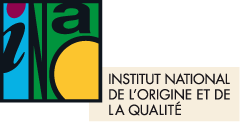News
Video review of the Raw Milk Cheese Conference: from meadow to plate, the essential global approach
The second scientific symposium on raw milk cheeses was held in Aurillac on November 16 and 17, and broadcast to 18 locations across France. Organized by the Conseil National des Appellations d'Origine Laitières (CNAOL), the Institut National de l'Origine et de la Qualité (INAO) and the Institut National de Recherche pour l'Agriculture, l'Alimentation et l'Environnement (INRAE), the symposium took a global, decompartmentalized approach to the current challenges facing raw milk cheeses and how to meet them, from milk production to processing, right through to consumption.
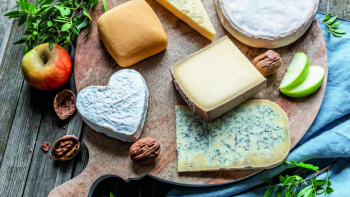
Video presentations, the symposium proceedings and the slideshows presented can be viewed on the Terroirs Fromages network website
In January 2020, an initial symposium on "Raw milk cheeses: between risks and benefits" was held at the Ministry of Agriculture.
Over the course of these days, researchers, doctors and health authority representatives helped to shed light on the debate and define the agricultural model and the place they should hold in our diet. In this way, these exchanges helped to deepen our knowledge of raw-milk cheeses, which are at the heart of multiple issues affecting both human and animal health, but also the preservation of resources, the environment and gastronomic heritage.
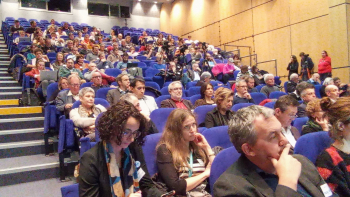
In France, 16% of ripened cheeses and over 3/4 of PDO cheeses are made from raw milk. "Today, raw-milk cheeses are considered too much from a health point of view. This is extremely simplistic! This partial analysis needs to be opened up to the other characteristics of these products: microbial ecosystem, health benefits, naturalness, heritage... to move towards a more global approach to raw-milk cheeses. It's crucial, for us producers and processors, to gain a better understanding of this living raw material, in order to offer PDO cheeses that are ever safer and higher quality, made with respect for tradition and sustainability. "introduces Hubert Dubien, President of CNAOL.
Think sanitary but not only
Farm or dairy, a raw milk cheese is one whose milk has not been heated above 40°C prior to manufacture. The absence of heating preserves the milk's "microbial flora", i.e. all the micro-organisms naturally present in the milk from the moment the animals are milked. This is why raw milk is a rich, fragile and living material.
If it is necessary to have a public policy around raw milk cheeses, it must not be decided solely from a health perspective. Health safety is an ongoing concern for milk and cheese producers. It's not just a matter of checking that practices, workshops and cheeses comply with regulations. According to Mathilde Lagrola, who wrote her thesis on the subject at the University of Montpellier 1: "From milking the milk to marketing the cheese, producers implement a set of precautions and attentions that demonstrate their vigilance towards micro-organisms, cheeses, milk and animals: these practices make it possible both to make a cheese that suits them and to avoid contamination by pathogenic bacteria."
.
"The health risks posed by raw-milk cheeses should not overshadow the benefits of raw-milk cheeses: cultural and gastronomic heritage, France's image abroad, value creation for operators and regions, meeting the expectations of consumers whose practices are governed by the specifications of the appellations..." says Carole Ly of INAO. Dominique Angèle Vuitton, Professor Emeritus of Clinical Immunology at the University of Franche-Comté, then recalled the beneficial relationship between health and the rural environment demonstrated by the Pasture cohort, and emphasized that "Living on farms, consuming raw milk, farm dairy products and cheeses have protective effects against allergies in children".
.In February 2024, a "White Paper" will be published on the benefits-risks of consuming cheeses rich in microbial biodiversity, raw milk cheeses. This book is a compendium of recent scientific research on the contribution of these products to our intestinal microbiota and their contribution to fortifying our immune system. This work was led by Stéphane Miszczycha under the impetus of the Fondation pour la biodiversité fromagère, CNAOL, Institut de l'Élevage and VetAgroSup.
The microbial flora under the microscope
Research into the microbial diversity of raw milk and its impact began in the late 1990s. As of 2010, knowledge is taking new directions with the use of DNA sequencing (metagenomics).
The link between cheese production and the soil, an expression of the taste of their terroir, takes on its full meaning here in the light of scientific advances. For example, Céline Delbes, research fellow at the UMR Fromages INRAE explains that "The sanitary quality of raw milk and its microbial diversity are determined on the farm by the implementation of numerous practices such as housing conditions, animal cleanliness, milking... or by the management of forages: pastures, grass, hay..". It is therefore crucial to have a systemic approach thought from the meadow, to farming methods through to cheese consumption to evoke the microbiodiversity of raw milk.
Raw milk cheeses in phase with the One Health vision
For the past 40 years, a reduction in the micro-organisms present in raw milk linked to the evolution of sanitary practices on farms has been observed. Today's challenge is to maintain a high level of microbial diversity, not only to preserve environmental biodiversity, but also to preserve the heritage of raw milk cheeses and the beneficial interactions they can have with the human microbiota. According to sociologist Tristan Fournier, "It's time to re-wild our bodies through our food, for reasons of nutritional health, but also, and perhaps above all, for moral and political reasons. Consumers are on a quest for naturalness".
Raw-milk cheeses are fully in line with this movement and with the "One Health" concept, which combines public health, animal health and welfare, ecosystem health, microbial ecology as well as the sanitary safety of the entire chain. This must involve all the disciplines and sectors concerned. Veterinarian Jean-Luc Angot insists that we must move away from compartmentalized approaches: "All players in the chain are involved and must collaborate. The production of raw milk cheeses demonstrates the relevance of the One Health approach, which ensures sustainable, healthy and safe food."
A raw milk cheese contains over a million micro-organisms. They vary from one product to another, depending on farming and processing practices. The MétaPDOcheese study mapped the microbial diversity of the milks of 44 PDO cheeses. A total of 820 bacterial and 333 fungal species were identified in the cheese samples. Cheese microbiota differ in richness and composition according to the cheese-making technology used and the PDO specifications. Dairy species, geographical area and cheese ripening practices demonstrate a contribution of biogeography and PDO-specific know-how in the formation of cheese microbiota.
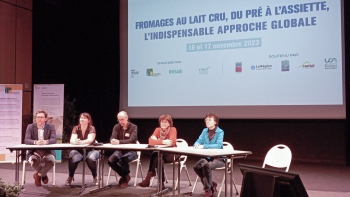
Back to the symposium program
Thursday, November 16, 2023
- 1:15pm: Reception at the Aurillac Convention Center
- 1:30pm: opening of the symposium by CNAOL, INAO and INRAE
- 2pm: Raw milk cheeses under the health prism: vers une pluralité des expertises
With presentations by Laurent Guillier (Microbiologist, ANSES), Mathilde Lagrola (Socio-anthropologist, Université Paul Valéry Montpellier 2), Choreh Farrokh (Director "Sécurité sanitaire", CNIEL), Stéphane Miszczycha (Microbiologist, VetAgroSup). - 5pm: Roundtable/Debate: Health safety and benefits of raw milk cheeses: complexity and multi-expertise to support public policies over several temporalities.
In the presence, representatives of public authorities, research professionals, including Maud Faipoux (Director General of Food) and Philippe Mauguin (Chairman and CEO of INRAE)
Friday, November 17, 2023
- 8h: Reception at the Aurillac Convention Center
- 8:30: Microbiodiversity in cheese: towards a systems approach
With presentations by Céline Delbès (Microbiologist, INRAE), Nadège Bel (Cheese Technology Manager, Actalia), Vincent Flammier (Technical Service Manager, Union des Producteurs de Beaufort), Damien Paineau (Ferments du Futur). - 10:45am: Towards new frameworks for raw milk cheeses?
With presentations by Tristan Fournier (Sociologist, CNRS), Elise Demeulenaere (Anthropologist, CNRS), Jean Luc Angot (Veterinarian, CGAAER). - 12:30pm: And now, concretely?
By Benoît Assemat, Inspector General - Ministry of Agriculture
Find out more
- The symposium was organized by INAO, INRAE and the Conseil national des appellations d'origine laitières (CNAOL).
- The preparation of this symposium benefited from the scientific support of INRAE, VetAgro Sup and the RMT Fromages de Terroirs.
- With the support of the Ville d'Aurillac, the Communauté d'agglomération du Bassin d'Aurillac, the Région Auvergne-Rhône-Alpes, the Département du Cantal and the Université Clermont Auvergne.
Press release
Communiqué de presse : Fromages au lait cru, du pré à l’assiette, l’indispensable approche globale
CP INAO : Fromages au lait cru, du pré à l’assiette, l’indispensable approche globale
All the news about the cheese industry
It was a weekend of festivities for the town of Roquefort-sur-Soulzon. On June 7 and 8, the emblematic Aveyron village...
News

News
The name "Pérail" is officially recognized as a Protected Geographical Indication (PGI), by publication, on May 26, 2025...
News
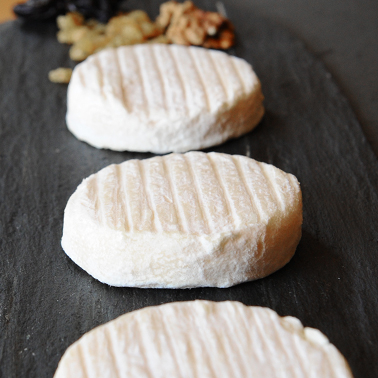
News
The World Dairy Summit was held in Paris from October 15 to 18. The event mobilized stakeholders from all over the world...
News
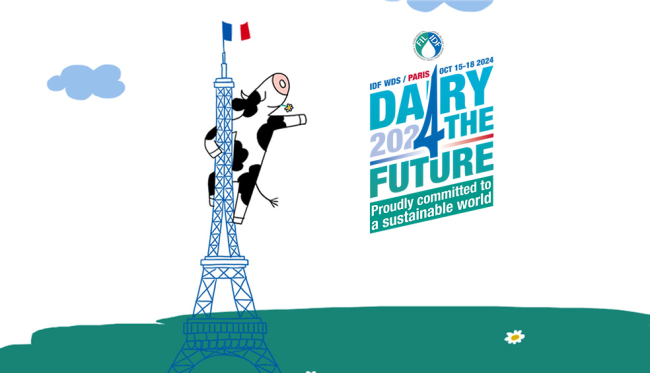
News
